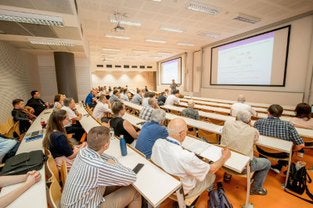Operations research in theory and practice

The conference was opened by the rector of our university, Előd Takáts, who recalled his university memories, including his exam in Measure Theory. He stressed that although this was not his research field, he was captured by the clarity and beauty of the theory and expressed his appreciation for researchers working in this area.
“The fact that the conference is held for the 35th time, proves that the field is durable and can meet the challenges of the times,” said chief organiser Csaba Kolos Ágoston, associate professor, Head of the Department of Operations Research and Actuarial Sciences. “In the case of operations research, the theory (we can call it mathematics), the implementation (we can call it information science) and the business, practical problem are all present at the same time, although not always in equal measure. This triad takes shape in the conference sessions,” said the chief organiser. He added that the conference had 91 registered participants and 75 abstracts had been submitted, which shows the interest of Hungarian researchers in different areas of operations research.
At the opening, tribute was paid to István Maros, who passed away recently and was one of the most respected figures in Hungarian operations research.
The first presentation at the plenary session was given by Sándor Kristály, mathematician and professor at the Babeș-Bolyai University and at the Óbuda University, who was a guest lecturer of the Corvinus CIAS International Research Centre during the autumn semester. He looked at the application of optimal material transport to the theory of sharp isoperimetric and functional inequalities. “It turns out that the two mathematical problems converge nicely,” he summarised.
The other two plenary speakers were András Kovács (SZTAKI) and András Balatoni (MNB), who gave presentations on Two-level optimisation in smart grids and Characteristics of Hungarian innovation-driven enterprises, respectively.
For further theoretical and practical studies of operations research can be found in the book of abstracts.